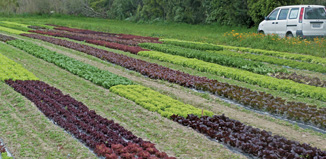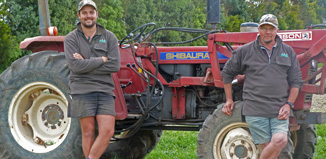
It’s a mouthful of green and red goodness – a healthy mixture of cos, frilled and oak-leaf lettuce, herbs and touches of bright orange calendula petals. It’s Kapiti Organics salad mix – yum!
Te Horo-based Alan and Gill Browne took on the mantle of Kapiti Organics in 2008 when the couple bought a lease to the organic seedling business, part of Common Property, in Hautere Cross Road. Although Alan had a horticulture background the business opportunity was a distinct reversal from his previous work.
“It was a real learning curve. I’d been working at Te Horo Ornamentals for 16 years, involved with their spraying programme. It was a pretty big change – going from chemicals to organics!”
Common Property is the 11 hectare BioGro certified property of Jim Kebbell and Marion Wood, who own Commonsense Organics, a family business selling organic foods and environmentally friendly products throughout the Wellington and Kapiti region. Once a market garden farmed by a co-operative of enthusiastic amateurs with a few spades and a dream of changing the world, Common Property is now a professionally run commercial unit. Alan tells me there are three independent owners on the property, including Sean Moffart, the manager.
These days Alan has the help of his son, Jonny, on the 2 hectare property, which, like much of the Te Horo/Otaki area, is based on a dried up river bed.
“The stones are hard work, but they do provide good drainage,” he explains. “We use plenty of organic seaweed, blood and bone, and fish meal fertiliser.”
Plants are grown in biodegradable polyethylene, and weeds are controlled by hand or by pushing a hoe between rows. Crops are rotated – every week the polyethylene is pulled up, then the land ploughed. They plant more than 2,000 seedlings a week, “about 12 cell trays.” It’s pretty labour-intensive and crops are slower growing than chemically farmed products.
“Our vegetables, lettuces and herbs aren’t pumped up with chemicals. We’re checked yearly by organic certifier, BioGro. They ensure the highest levels of organic integrity have been met – every step of the way.”
Seed is sourced from South Pacific Seeds or Kings. Alan and Jonny use pilled seed, where the seed is coated with clay resulting in a small, “ladybug-sized” pellet. It makes planting easier and germination rates are improved. Alan says they achieve a 99% germination rate using this method.
It’s about 8 weeks from planting out to picking (in the winter months), 4 weeks in the summer. Generally planting starts in September/October although this year Alan says they began planting in August, “a warm month.” Planting during summer months is sometimes done in the cool of the evening.
“It’s often too hot to plant during the day in summer,” adds Jonny. “On the other hand, in winter, if the soil becomes too wet, we can’t work it – crops become prone to fungus disease.”
Although most action stops around the end of May, future plans include a new tunnel house, which would enable production to continue throughout the year.
Ten different varieties of lettuce are grown including red and green oak leaf, frilly and cos (they’re presently trialling ‘Moonred,’ a dark red cos lettuce). Your typical Te Horo salad will also include mizuna, mesclun, kale, parsley, rocket, mustard, dill and calendula. Recently, responding to market demand, they’ve planted Florence fennel, “it needs a good warm autumn to fatten the bulb,” and they also grow capsicums, pumpkin and cucumber. All salad products are hand-picked (three times a week), graded then washed in a stainless steel vat. They also use frost cloth in the summer to keep plants clean, “and to minimise damage from the white cabbage butterfly.”
Nature can be destructive in other ways. Although the property is sheltered by belts of willows, natives and exotics, the hail storm of 2012 sent a wall of ice through their plantings.
“It shredded the lettuce – we are vulnerable to nature. That’s where the tunnel house will help.”
Kapiti Organics supply several local cafes, as well as the five Commonsense Organic stores. You’ll find Te Horo salad on the menu at Café Te Horo, The Red House Cafe, Reds Cafe, Manakau’s Quarter Acre Café, and Otaki’s Café Ra.

Alan and Jonny deliver locally, mostly around Otaki, and couriers deliver further afield, to outlets such as Organic Living in Palmerston North, and the Paekakariki fruit and veggie store. It’s a one-on-one style of delivery, the friendly, personal contact enabling them to establish a positive business base, and a good rapport with clients, “confident we’ve got a great product.”

